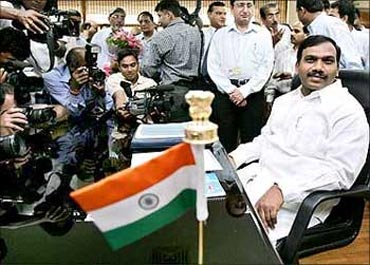
Indicting A Raja, the Comptroller and Auditor General of India (CAG) on Tuesday said 2G spectrum allocation had caused revenue loss of Rs 1.76 lakh crore (Rs 1,760 billion) as the then telecom minister had ignored the advice of the prime minister besides those of ministries of law and finance, giving "undue" benefits to Anil Ambani-led RCom.
The CAG highlighted that the entire process of allocation of Unified Access Service licences "lacked transparency" and was undertaken in an "arbitrary, unfair and inequitable manner," in the process "flouting every canon of financial propriety, rules and procedures."
The 77-page report of the CAG tabled in Parliament said due diligence was not followed and even the recommendations of the telecom regulator TRAI were "not followed in spirit".
The report said the "presumptive" loss caused to the exchequer through spectrum allocation to 122 licencees and 35 dual technology licences in 2007-08 was Rs 1,76,645 crore. It pegged the figures on the basis of 3G auction held earlier this year in which the government mopped up over Rs 67,000 crore (Rs 670 billion).
It said there was an "imperative need to fix responsibility and enforce accountability for the lapses highlighted in the audit report."
. . .
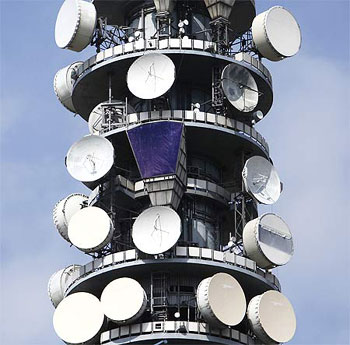
Elaborating on the lapses and irregularities, the government auditor said Prime Minister Manmohan Singh had "stressed on the need for a fair and transparent allocation of spectrum" while the ministry of finance had sought for the decision regarding spectrum pricing to be considered by an EGoM (Empowered Group of Ministers).
"Brushing aside their concerns and advices, the Department of Telecommunications, in 2008, proceeded to issue 122 new licences for 2G spectrum at 2001 prices, by flouting every canon of financial propriety, rules and procedures," the CAG said.
The DoT also did not do the requisite due diligence in the examination of the applications submitted for the licences, leading to the grant of 85 out of 122 licences to the "ineligible applicants" as all these firms did not have stipulated paid-up capital at the time of application.
Further 45 out of 85 licencees were issued to companies which failed to satisfy conditions of main object clause in the memorandum of Association (MoA), it said.
The CAG said the process of giving dual technology licences to leading telecom firms including Reliance Communications and Tata Teleservices "lacked transparency and fairness," and equal opportunity was denied to other similarly placed operators who could apply for use of dual technology only after formal announcement of the policy.
. . .
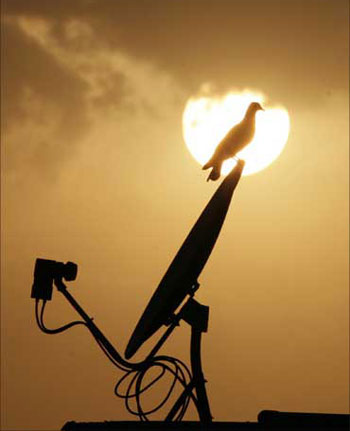
Noting that this approval (dual technology use) had violated Cabinet decision of 2003 to allow additional spectrum at 2001 prices, the auditor said, "Deviation from a Cabinet decision should normally be with the approval of Cabinet.
"However, in the present case, such a crucial decision to permit service providers to offer access using combination of technologies (CDMA, GSM and/or any other) under the same licence with dual spectrum allocation was taken without the matter being referred to the Cabinet."
It said the dual technology was introduced in October 2007 in a "hasty and arbitrary manner" and in-principle approval was given to three operators on a day prior to announcement of the policy, which gave "the perception of discrimination against other players in the field."
The companies which got the licences, were created barely months earlier and "deliberately suppressed facts, disclosed incomplete information, submitted fictitious documents and used fraudulent means for getting licences and thereby access to spectrum.
"Onus of these licences, obtained at unbelievably low price, have in turn sold significant stakes in their companies to Indian/foreign companies at high premium within a short period of time," the auditor said.
. . .
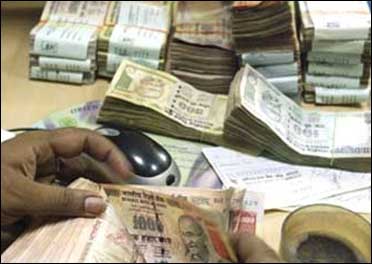
The premium earned by these "new entrants" to the telecom sector was nothing but the true value of the spectrum, which should have normally accrued to the public exchequer, "had the transparent and fair market mechanism been followed" for the allocation of these licences, the CAG said.
In the report, the CAG noted that the ministry of communication and IT "decided to go ahead with arbitrarily deciding that the cut-off date for issuance of Letters of Intent would be advanced to September 25, 2007 and applications received would be decided on FCFS (first-come first-served) basis."
In November, 2007, Prime Minister Manmohan Singh had written to the telecom ministry suggesting introduction of "transparent methodology" of auction, "revision of entry fee" in the "backdrop of inadequate spectrum and large number of applications received for fresh licences."
The CAG highlighted that the law ministry had suggested setting up of an Empowered Group of Ministers to discuss the large number of applications and spectrum pricing, but the telecom ministry rejected it saying "the need for forming and EGoM arises when a new policy is being framed and in this particular issue no new policy for grant of UASL (unified access service licences) was being framed."
The auditor, however, said the "contention of the DoT is untenable as the rejection of the advice" of the law minister to have detailed deliberations on the issues in the EGoM on the ground that changes in policy might lead to litigation "goes against the well established and time-tested procedures of functioning of the government and the collective responsibility of the Union Cabinet."
. . .
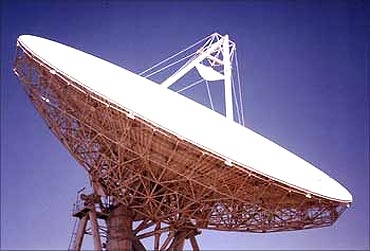
Cong says it will react to CAG report after studying it
The Congress on Tuesday said it would react on the CAG report, which indicted former telecom minister A Raja for ignoring the advice of prime minister, finance and law ministries to allocate 2G spectrum to new players in 2008, after studying it.
"The CAG report has been tabled. We would react to the report after we have studied it. So far as as the JPC is concerned, the stand of both the Congress party and the government has been made clear," Congress spokesperson Manish Tewari told reporters outside Parliament.
In the report, tabled in both houses of Parliament, the CAG noted that the presumptive loss caused to the exchequer through spectrum allocation to 122 licencees and 35 dual technology licences in 2007-08 was Rs 1,76,645 crore (Rs 1,766.45 billion). It pegged the figures on the basis of 3G auction held earlier this year in which the government mopped up over Rs 67,000 crore (Rs 670 billion).
Parliament stalled for fourth day
The logjam over opposition demand for JPC probe into the 2G spectrum scam stalled proceedings in both Houses of Parliament for the fourth day even as government made efforts to break the impasse.
A united opposition led by BJP and supported by AIADMK, TDP, SP, JD-U and Shiv Sena remained adamant on the demand for a Parliamentary probe into irregularities in spectrum allocation as pointed out in the CAG report placed in both Houses.
. . .
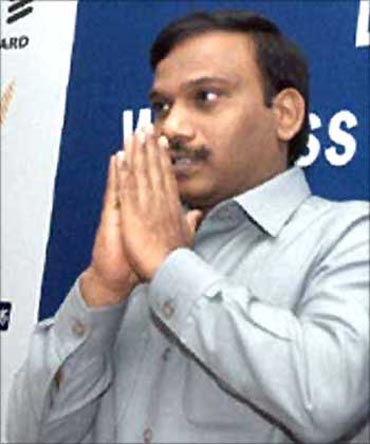
The CAG indicted former Telecom Minister A Raja of DMK stating that he ignored the advice of the prime minister, finance minister and the law minister on the allocation of frequency for mobile telephones causing a huge loss of Rs 1.76 lakh crore (Rs 1,760 billion) to the exchequer.
The trouble began soon after both Lok Sabha and Rajya Sabha assembled for the day to take up Question Hour. An unrelenting opposition was not ready for anything less than the joint Parliamentary Committee probe into the scam.
The opposition members trooped into the well and resorted to slogan shouting.
Congress members hit back and tried to raise the issue of Karnataka Chief Minister B S Yeddyurappa's alleged involvement in allocation of industrial land to his sons.
Amid uproar, the Lok Sabha was adjourned for the day at noon after an earlier adjournment during Question Hour, while Rajya Sabha could not function till 2 p.m.
The same scenario prevailed in the Upper House when it met at 2 PM and the presiding officer P J Kurien was forced to adjourn the proceedings till Thursday, tomorrow being a holiday on account of Eid.
Leader of the Lok Sabha Pranab Mukherjee met leaders of political parties in an effort to end the logjam which has stalled the proceedings.
PM hints CAG be permitted to go into PPP accounts
Indicating the official auditor CAG be permitted to look into the books of public-private partnership (PPP) projects, Prime Minister Manmohan Singh on Tuesday underscored the need to ensure transparency in these infrastructure schemes.
. . .
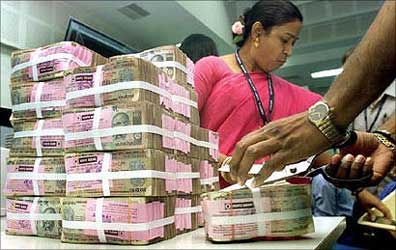
"CAG will play a leading role in ensuring that these new initiatives (PPP) deliver as intended," the prime minister said at a function to mark the 150 years of Comptroller and Auditor General of India.
"There is a need to improve the structure of private-public partnership arrangements to ensure that they are transparent, ensure competitiveness, and adequately safeguard public interest," Singh said.
The prime minister remarks came at the same function where CAG Vinod Rai sought permission to audit the books of PPP as huge amount of public money was going into these projects.
The role of the CAG is confined to auditing government institutions and public sector enterprises.
A Raja, who is a member of the Lok Sabha, was not present in the House when the report was tabled as soon as it reassembled at noon after an hour-long adjournment.
After the extracts of the report came out in the media, the Opposition launched a blistering attack on the government demanding Raja's removal and a Joint Parliamentary Committee probe.
Raja has maintained that he has done no wrong and distributed the licenses as per the policies followed by his predecessors since 1999.
He initially refused to resign but finally quit on Sunday after intense pressure.